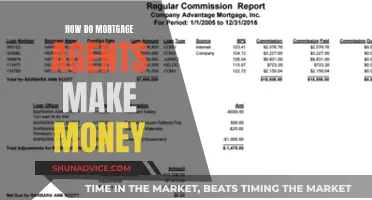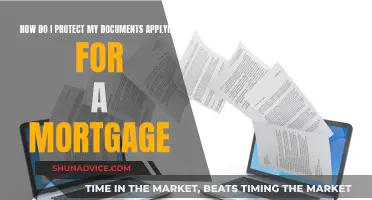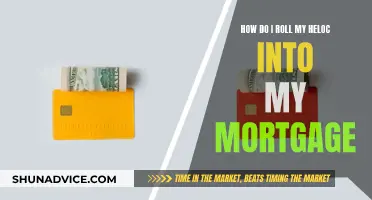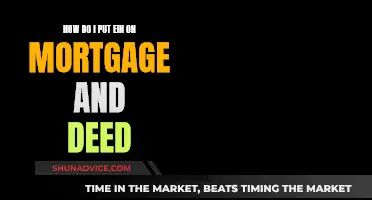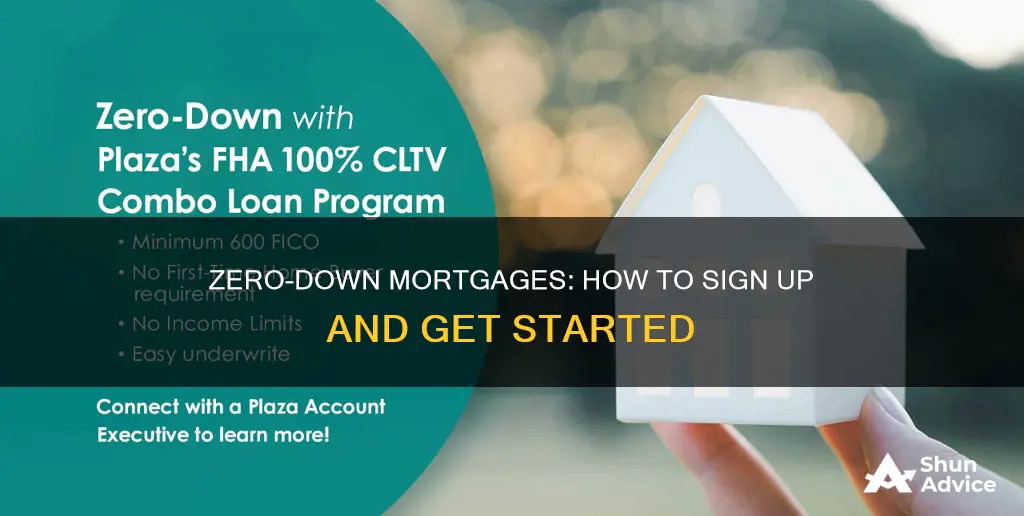
Zero-down mortgages, also known as no-money-down mortgages, are home loans that do not require a down payment. In other words, they allow you to finance 100% of a home's purchase price. While they were more readily available before the subprime mortgage crisis of 2008, today, they are extremely rare and typically only available to select individuals with high credit scores and adequate income. However, there are still several no-down-payment public programs that aspiring homeowners may qualify for, including government-backed loans such as VA loans and USDA loans. Additionally, many states and counties offer homebuyer incentive programs that provide down payment assistance, low-interest-rate home loans, and more.
Characteristics and requirements of a zero-down mortgage
| Characteristics | Values |
|---|---|
| Down payment | 0% |
| Eligibility | Military service members, veterans, surviving spouses, lower- to moderate-income buyers purchasing homes in eligible rural areas, high credit scores, adequate income to repay the loan |
| Lenders | USDA, VA, Fannie Mae, Freddie Mac, FHA, Sunmark Credit Union, Bank of America, Guild Mortgage, Rate (previously Guaranteed Rate), Rocket Mortgage |
| Fees | Funding fee, upfront guarantee fee, annual guarantee fee, closing costs |
| Pros | No down payment, become a homeowner sooner, keep more cash on hand |
| Cons | Higher interest rates, higher monthly payments, increased overall interest costs, higher risk of being underwater on your mortgage |
| Government-backed | Yes |
What You'll Learn

Requirements for a zero-down mortgage
For instance, to qualify for a 3% down conventional loan, your income cannot exceed 80% of the area's median income, and your credit score must be at least 620. On the other hand, the USDA loan program does not set a minimum credit score requirement, but most lenders require a score of at least 640, and your income must not exceed 115% of the area median income.
Additionally, it is important to note that zero-down mortgages come with a few downsides. For example, you will likely face higher monthly payments and pay more interest over the life of the loan since you are financing the full purchase price. Starting with no equity can also be risky if home values fluctuate.
- VA loans: These are available to military service members, veterans, and their surviving spouses. They are guaranteed by the US Department of Veterans Affairs and typically do not require a down payment or mortgage insurance.
- USDA loans: These are intended for borrowers in eligible rural or suburban areas with low to moderate incomes. They are guaranteed by the US Department of Agriculture and do not require a down payment. However, they have an upfront funding fee of 1-3.3% and an annual fee of 0.35%.
- Guild's Zero Down Mortgage: This option combines a 3.5% FHA loan with a forgivable second mortgage, resulting in a zero-down payment. It requires a minimum credit score of 600.
- Flagstar Bank's Destination Home Mortgage: This program allows borrowers in eligible counties to put zero down with no mortgage insurance and only a 600 FICO score.
Strategies for Recasting Your Mortgage: A Guide
You may want to see also

Pros and cons of zero-down mortgages
Zero-down mortgages, also known as no-down-payment mortgages, are mortgages that do not require a down payment. They are rare and usually only available to people with high credit scores and adequate income to repay the loan. The federal government backs USDA and VA loans, which do not require a down payment.
Pros:
- You can buy a house sooner: With the median home price in the US being over $400,000, saving up for a down payment can take years. Zero-down mortgages allow you to become a homeowner sooner without having to spend years saving.
- You get to keep more cash on hand: Without a down payment, you will have more cash available for other purposes, such as emergency savings, remodeling, or investing.
- No private mortgage insurance: Zero-down mortgages do not require private mortgage insurance (PMI), which is typically required for conventional loans if you put down less than 20%. PMI can be expensive and add to the cost of homeownership.
Cons:
- Higher interest rates: Zero-down mortgages often come with higher interest rates than traditional mortgages. Lenders usually offer the best terms to borrowers who can pay cash upfront.
- Little to no equity: Without a down payment, you start with little to no equity in the home. If home values fall, you could end up owing more on the home than it's worth, making it difficult to sell or refinance.
- Higher fees: While zero-down mortgages do not have PMI, other fees may apply. For example, VA loans come with a funding fee ranging from 1.25% to 3.30% of the amount borrowed, paid at closing. USDA loans charge a guarantee fee of 1% of the loan amount at closing, plus an annual fee of 0.35% of the remaining balance.
- Higher monthly repayments: Rates on loans with low deposits tend to be higher, resulting in higher monthly repayments.
Settling a Charged-Off Second Mortgage: What You Need to Know
You may want to see also

Lenders offering zero-down mortgages
Zero-down mortgages are rare and typically only available to people with high credit scores and adequate income to repay the loan. They are also known as no-down-payment mortgages. The federal government backs USDA and VA loans, which do not require a down payment. Here are some lenders that offer zero-down mortgages:
USDA Loans
The U.S. Department of Agriculture (USDA) guarantees USDA home loans for lower- to moderate-income buyers purchasing homes in eligible rural areas. These loans do not require a down payment, but there is an upfront guarantee fee of 1% of the principal loan amount, which can be financed into the mortgage. There is also an annual fee of 0.35% of the loan amount for the life of the loan.
VA Loans
The U.S. Department of Veterans Affairs (VA) offers VA loans to active-duty service members, military veterans, past or present National Guard or Reserve members, and surviving spouses of deceased veterans. These loans do not require a down payment and do not charge mortgage insurance. However, there is a funding fee that can be paid at closing or financed into the mortgage.
Rocket Mortgage
Rocket Mortgage is the largest mortgage lender by volume and offers a range of affordable borrowing options, including low-down-payment mortgages and closing cost credits. They also have a mobile app for borrowers to apply through.
NBKC
NBKC offers low average rates and a user-friendly website. However, their mobile app is not aimed at mortgage borrowers, and customized mortgage rates require supplying contact information.
Guild Mortgage and Rate (previously Guaranteed Rate)
These lenders offer 1% down mortgages, which can be a great option for those who qualify.
Sunmark Credit Union
Sunmark Credit Union offers a no-down-payment option called the Dream Bigger Mortgage without permanent mortgage insurance.
State and County Programs
Many states and counties offer homebuyer incentive programs that provide down payment assistance, low-interest-rate home loans, and more. For example, the Massachusetts Housing Finance Agency (MassHousing) offers up to $25,000 in down payment assistance to eligible borrowers, while the My First Texas Home program provides up to 5% of the mortgage amount in down payment and closing cost assistance.
Removing Your Husband's Name from the Mortgage: A Step-by-Step Guide
You may want to see also

Government-backed zero-down mortgages
Government-backed mortgages, first-time home buyer loans with zero down, and flexible financing options can help you buy a house with no money down and expedite your journey to homeownership. Here are some options for government-backed zero-down mortgages:
USDA Loans
The U.S. Department of Agriculture (USDA) guarantees USDA home loans for lower- to moderate-income buyers purchasing homes in eligible rural areas. These loans don't require a down payment, but there is an upfront guarantee fee of 1% of the principal loan amount, which can be financed into the mortgage. Additionally, there is an annual fee of 0.35% of the loan amount that lasts for the life of the loan.
VA Loans
If you are a military service member, veteran, or surviving spouse, you may qualify for a VA loan guaranteed by the U.S. Department of Veterans Affairs. VA loans typically don't require a down payment and don't charge mortgage insurance. However, you will need to pay a funding fee, either at closing or by financing it into your mortgage.
Good Neighbor Next Door (GNND) Program
The Good Neighbor Next Door (GNND) program is for borrowers who work in select public service professions, including teachers, firefighters, law enforcement, and emergency medical technicians. This program may offer zero-down payment options or assistance.
State and Local Programs
Many states and counties offer homebuyer incentive programs that provide down payment assistance, low-interest-rate home loans, and more. For example, the Massachusetts Housing Finance Agency (MassHousing) offers up to $25,000 in down payment assistance to eligible borrowers, while the My First Texas Home program provides up to 5% of the mortgage amount in down payment and closing cost assistance.
It's important to note that zero-down mortgages can have drawbacks, such as higher interest rates and lower equity. Additionally, eligibility requirements for these programs may vary, and factors such as credit score, debt-to-income ratio, and income limits may apply. Make sure to explore your options, compare quotes from multiple lenders, and carefully consider the benefits and risks before choosing a zero-down mortgage.
Prepaying Your Mortgage: Strategies for Financial Freedom
You may want to see also

Alternative low-down-payment mortgages
No-down-payment mortgages are typically only available to people with high credit scores and adequate income to repay the loan. These loans are rare and usually come with higher interest rates. If you are looking for alternative low-down-payment mortgages, there are several options available.
USDA Loans
The USDA Loans
The U.S. Department of Agriculture (USDA) guarantees USDA home loans for lower- to moderate-income buyers purchasing homes in eligible rural areas. These loans do not require a down payment but charge an upfront guarantee fee of 1% of the principal loan amount, which can be financed into the mortgage. There is also an annual fee of 0.35% of the loan amount for the life of the loan.
VA Loans
If you are a military service member, veteran, or surviving spouse, you might qualify for a VA loan guaranteed by the U.S. Department of Veterans Affairs. These loans do not require a down payment and do not charge mortgage insurance. However, you will need to pay a funding fee, either at closing or by financing it into your mortgage. The fee ranges from 1.25% to 3.30% of the amount borrowed.
FHA Loans
FHA loans are backed by the Federal Housing Administration and allow you to put as little as 3.5% down on a home purchase. You will need to pay an upfront mortgage insurance premium (MIP) of 1.75% of your loan amount and an annual MIP that varies depending on your down payment and other factors. If you make a down payment of 10% or more, you will pay the annual MIP for 11 years; otherwise, you will pay it for the life of the loan.
Fannie Mae's HomeReady Program
Fannie Mae's HomeReady mortgage program offers a 3% down conventional loan for low-income homebuyers. To qualify, your income cannot exceed 80% of the area's median income, and you must have a credit score of at least 620.
Freddie Mac's Home Possible
Freddie Mac's Home Possible program is a fixed-rate loan with a down payment as low as 3%. It is available for first-time or repeat buyers with credit scores of 620 or higher. Borrowers can reduce their mortgage insurance once they reach 10% equity.
State and County Programs
Many states and counties offer homebuyer incentive programs that provide down payment assistance, low-interest-rate home loans, and more. For example, the Massachusetts Housing Finance Agency offers up to $25,000 in down payment assistance to eligible borrowers, while the My First Texas Home program provides up to 5% of the mortgage amount in down payment and closing cost assistance.
Generate Mortgage Leads: Strategies for Success
You may want to see also
Frequently asked questions
To sign up for a 0-down mortgage, you must meet the eligibility requirements, which vary depending on the specific loan program. Factors such as credit score, debt-to-income ratio, and income limits may be considered. For instance, Rocket Mortgage requires a credit score of at least 580 for a VA loan and at least 620 or 640 for a USDA loan.
USDA loans are for lower- to moderate-income buyers purchasing homes in eligible rural or suburban areas. The home must be a single-family unit and treated as the primary residence. The combined gross income in the household can't be more than 115% of the median income of the area.
VA loans are for military service members, veterans, or their surviving spouses. To qualify, you must meet specific service requirements.
If you don't qualify for a 0-down mortgage, you can consider alternative options such as government grants, down payment assistance programs, or conventional loan programs with low down payment requirements. For example, Fannie Mae's HomeReady program offers a 3% down conventional loan for lower-income buyers with a credit score of at least 620.




